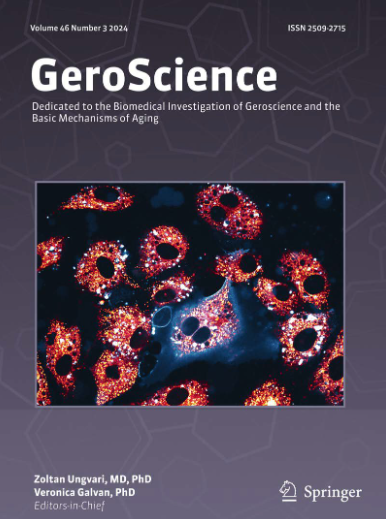Dietary supplement use in longevity: evidence from 2,877 centenarians.
IF 5.4
2区 医学
Q1 GERIATRICS & GERONTOLOGY
引用次数: 0
Abstract
Centenarians represent a population achieving extreme longevity. Despite growing interest in the role of dietary supplements in aging, there is limited research examining their use among centenarians. This study assessed the prevalence, duration, and frequency of dietary supplement use among centenarians in China. Data on self-reported supplement usage were sourced from the 2018 wave of the Chinese Longitudinal Healthy Longevity Survey. The analysis included 2,169 female and 708 male centenarians. Descriptive statistics were used to report prevalence, duration, and frequency of use, stratified by sex. Overall, 10.7% (95% confidence interval [CI] = 9.4%, 12.0%) of females and 12.3% (95% CI = 9.9%, 14.7%) of males reported using dietary supplements. The prevalence of calcium, protein, multivitamin, vitamin A/D, iron, zinc, and docosahexaenoic acid (DHA) use was between 6.5-7.3%, 3.7-5.8%, 2.8-3.0%, 1.9-2.1%, 1.2-1.4%, 1.2-1.3%, 0.4-0.7%, respectively. The frequency of use was typically reported as "often". The median duration of supplement use was from 2 to 10 years. Most supplement users (7.3-8.8%) consumed a single supplement. Approximately one in ten centenarians in China reported using dietary supplements. The most commonly consumed supplements were calcium, protein, and multivitamins, while DHA was the least commonly used. Participants who reported using supplements generally indicated regular consumption. The overall pattern of dietary supplement use was similar between females and males. Given the low overall prevalence of supplement use, this lifestyle practice appears to play a relatively minor role in the lives of centenarians in China.膳食补充剂对长寿的影响:来自2877名百岁老人的证据。
百岁老人代表了极度长寿的人群。尽管人们对膳食补充剂在衰老中的作用越来越感兴趣,但关于它们在百岁老人中的作用的研究有限。本研究评估了中国百岁老人膳食补充剂使用的流行程度、持续时间和频率。自我报告的补充剂使用数据来自2018年中国纵向健康长寿调查。该分析包括2169名女性和708名男性百岁老人。描述性统计用于报告患病率、持续时间和使用频率,并按性别分层。总体而言,10.7%(95%可信区间[CI] = 9.4%, 12.0%)的女性和12.3% (95% CI = 9.9%, 14.7%)的男性报告使用膳食补充剂。钙、蛋白质、多种维生素、维生素A/D、铁、锌、二十二碳六烯酸(DHA)的使用率分别为6.5 ~ 7.3%、3.7 ~ 5.8%、2.8 ~ 3.0%、1.9 ~ 2.1%、1.2 ~ 1.4%、1.2 ~ 1.3%、0.4 ~ 0.7%。使用频率通常报告为“经常”。补充剂使用的中位持续时间为2至10年。大多数补充剂使用者(7.3-8.8%)只服用一种补充剂。据报道,中国大约十分之一的百岁老人在服用膳食补充剂。最常食用的补充剂是钙、蛋白质和多种维生素,而DHA是最不常用的。报告服用补充剂的参与者通常表示定期服用。膳食补充剂使用的总体模式在女性和男性之间是相似的。鉴于补充剂使用的总体流行率较低,这种生活方式在中国百岁老人的生活中似乎起着相对较小的作用。
本文章由计算机程序翻译,如有差异,请以英文原文为准。
求助全文
约1分钟内获得全文
求助全文
来源期刊

GeroScience
Medicine-Complementary and Alternative Medicine
CiteScore
10.50
自引率
5.40%
发文量
182
期刊介绍:
GeroScience is a bi-monthly, international, peer-reviewed journal that publishes articles related to research in the biology of aging and research on biomedical applications that impact aging. The scope of articles to be considered include evolutionary biology, biophysics, genetics, genomics, proteomics, molecular biology, cell biology, biochemistry, endocrinology, immunology, physiology, pharmacology, neuroscience, and psychology.
 求助内容:
求助内容: 应助结果提醒方式:
应助结果提醒方式:


